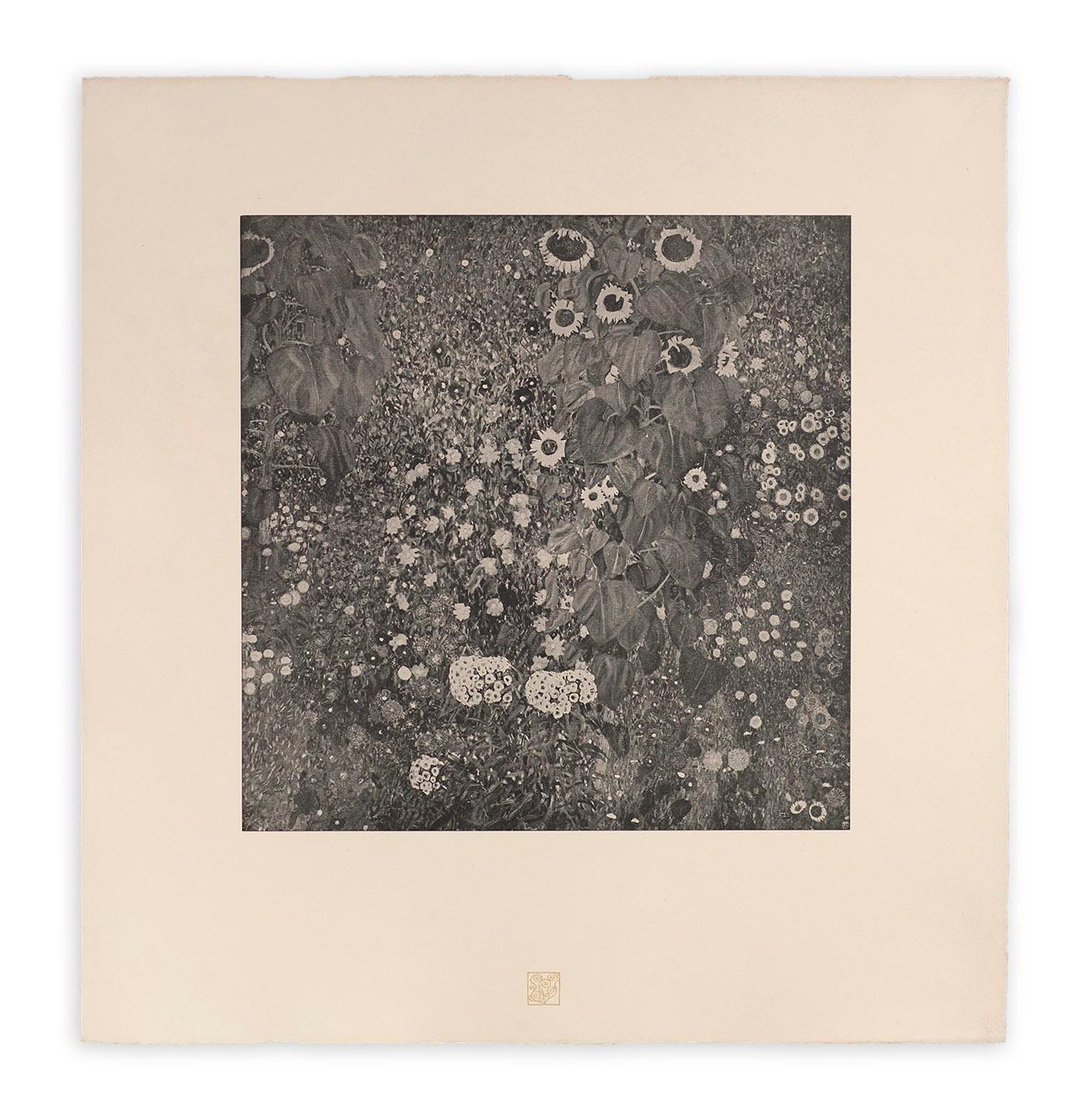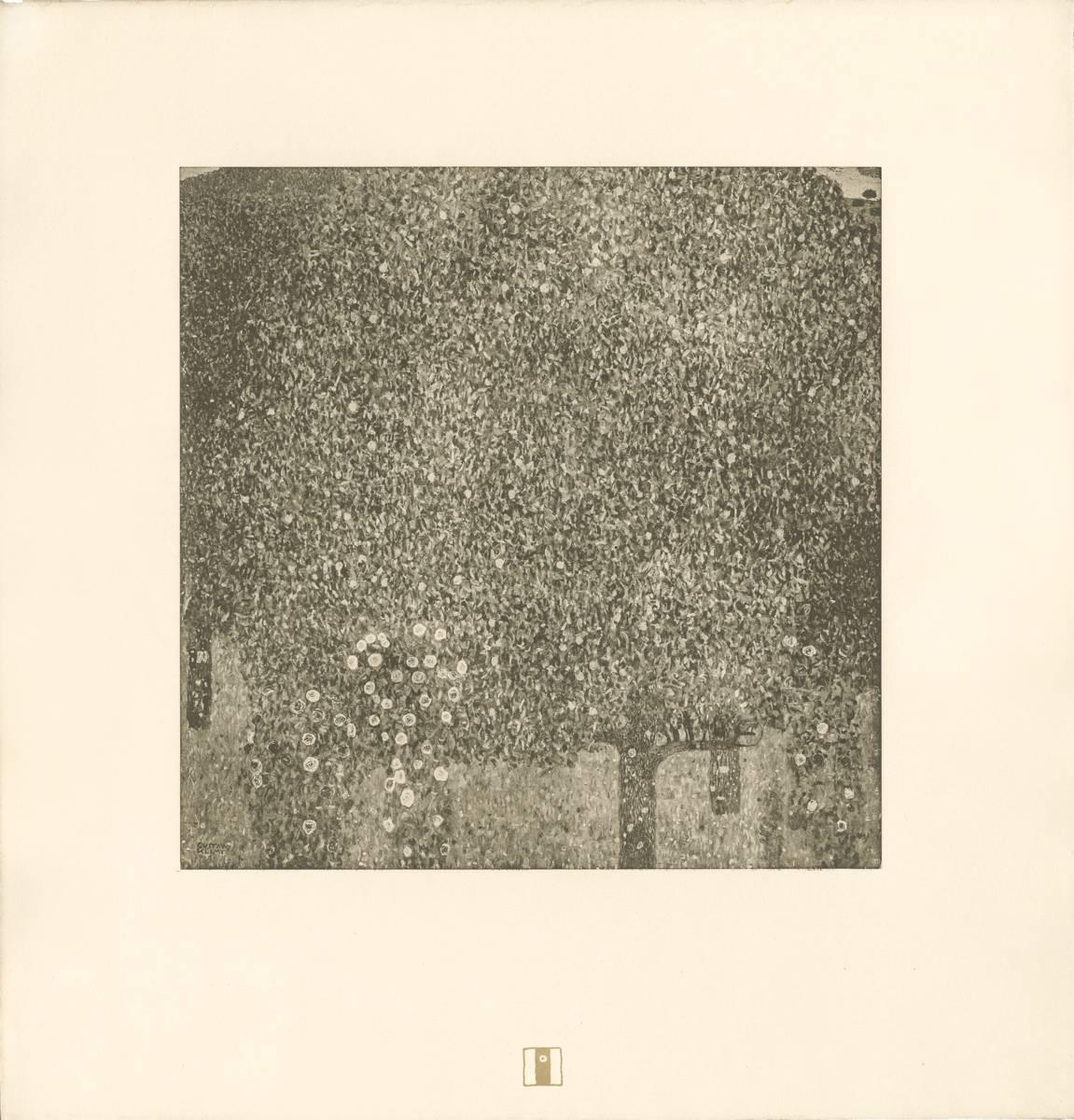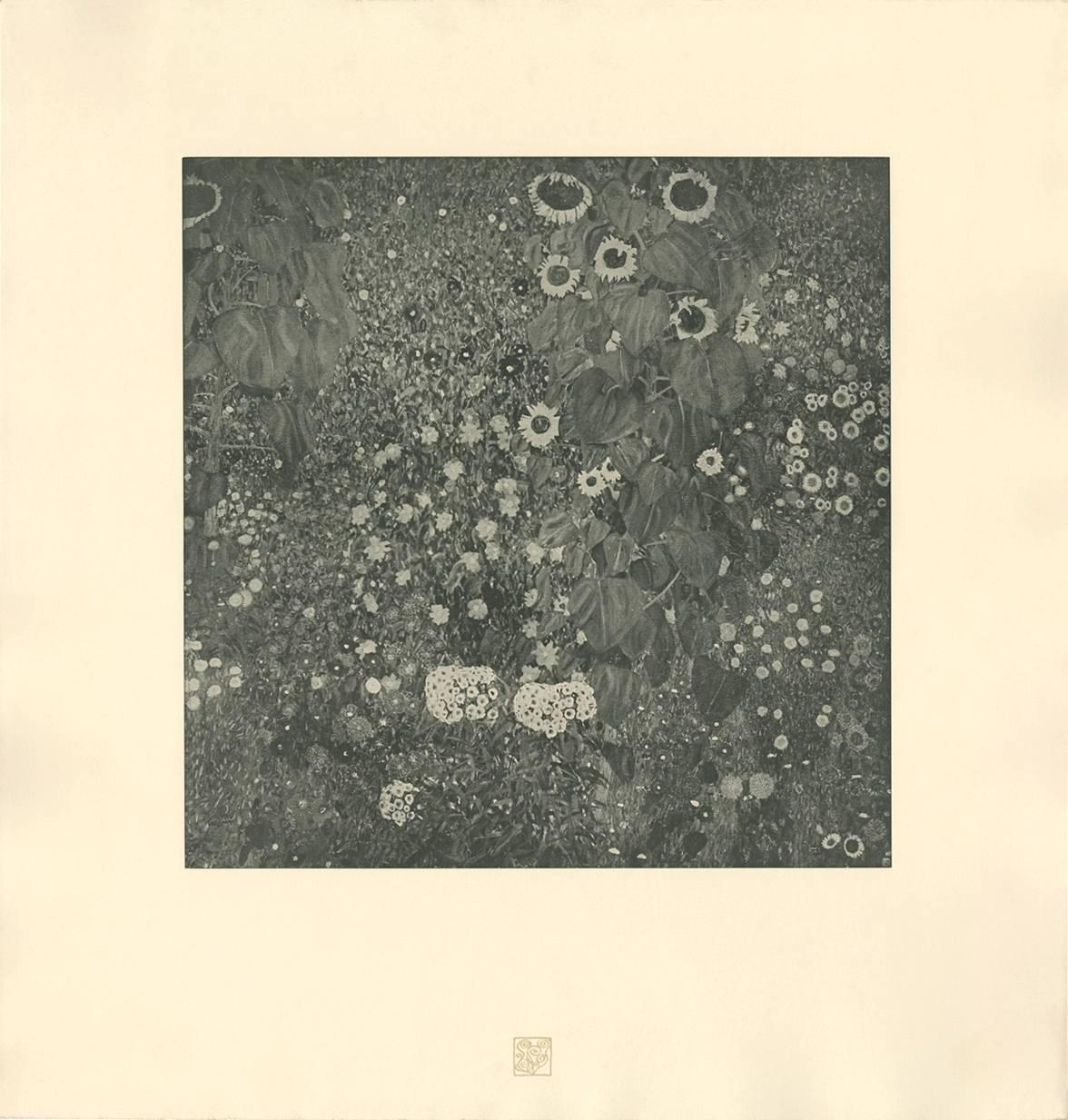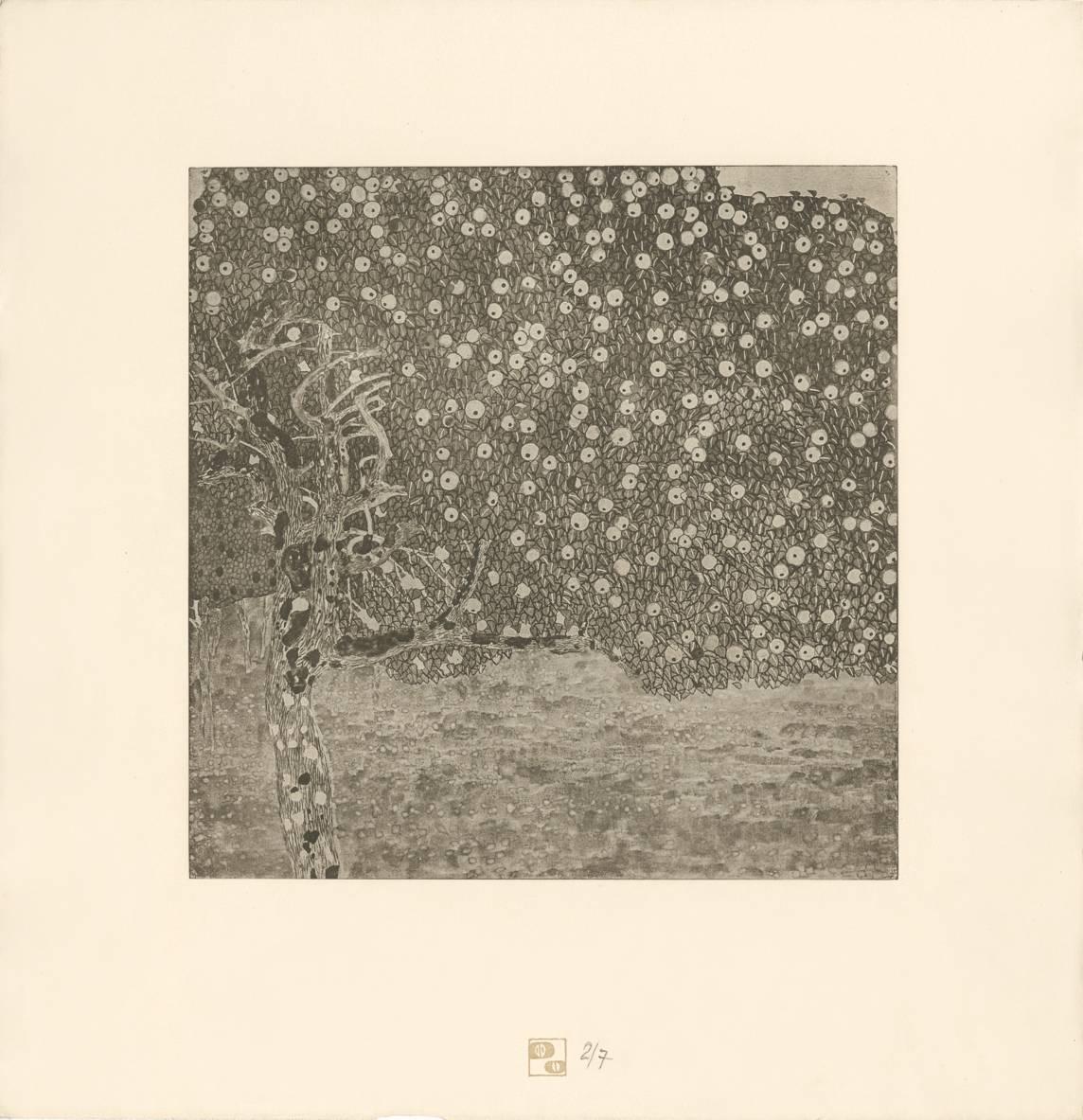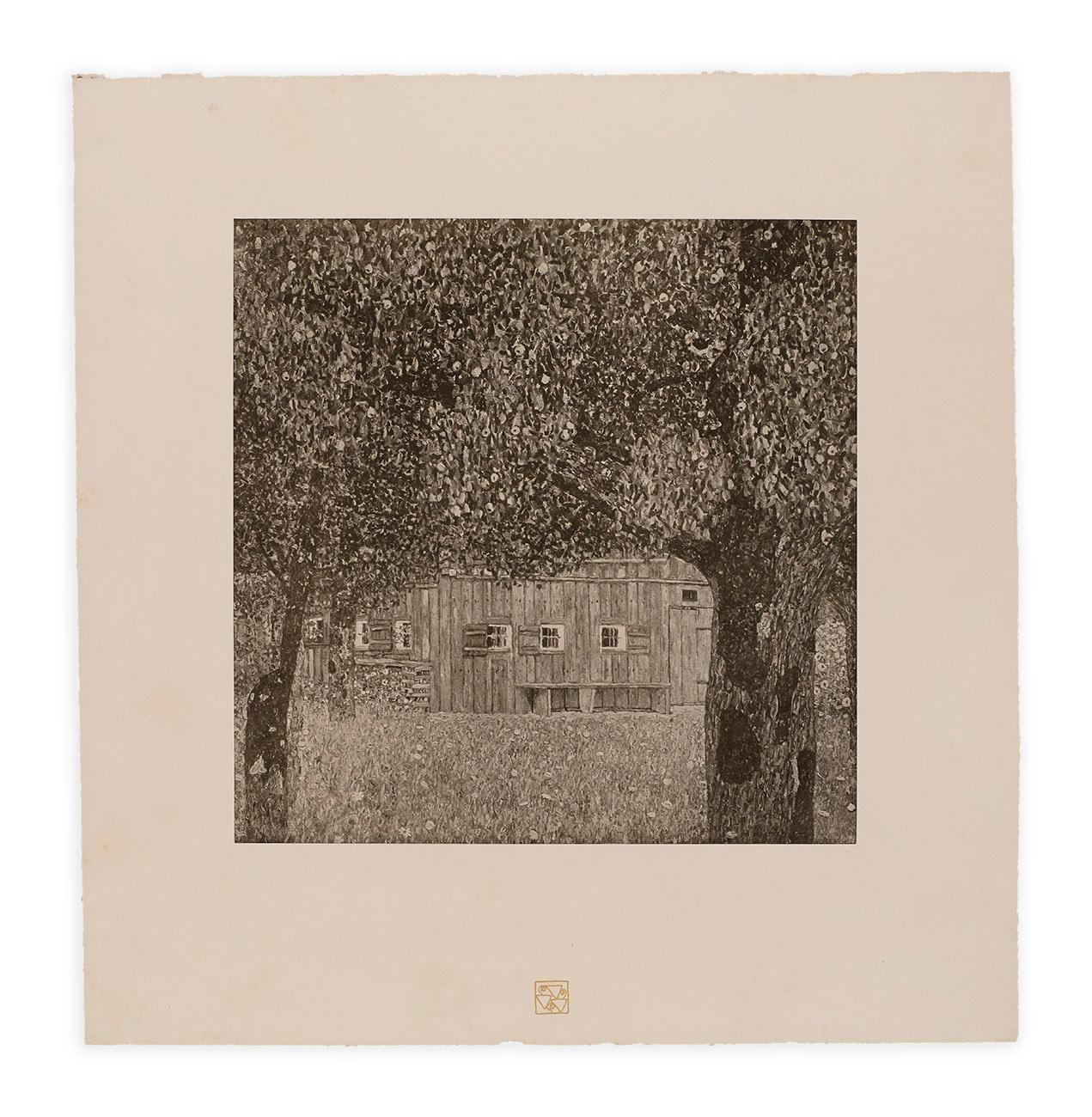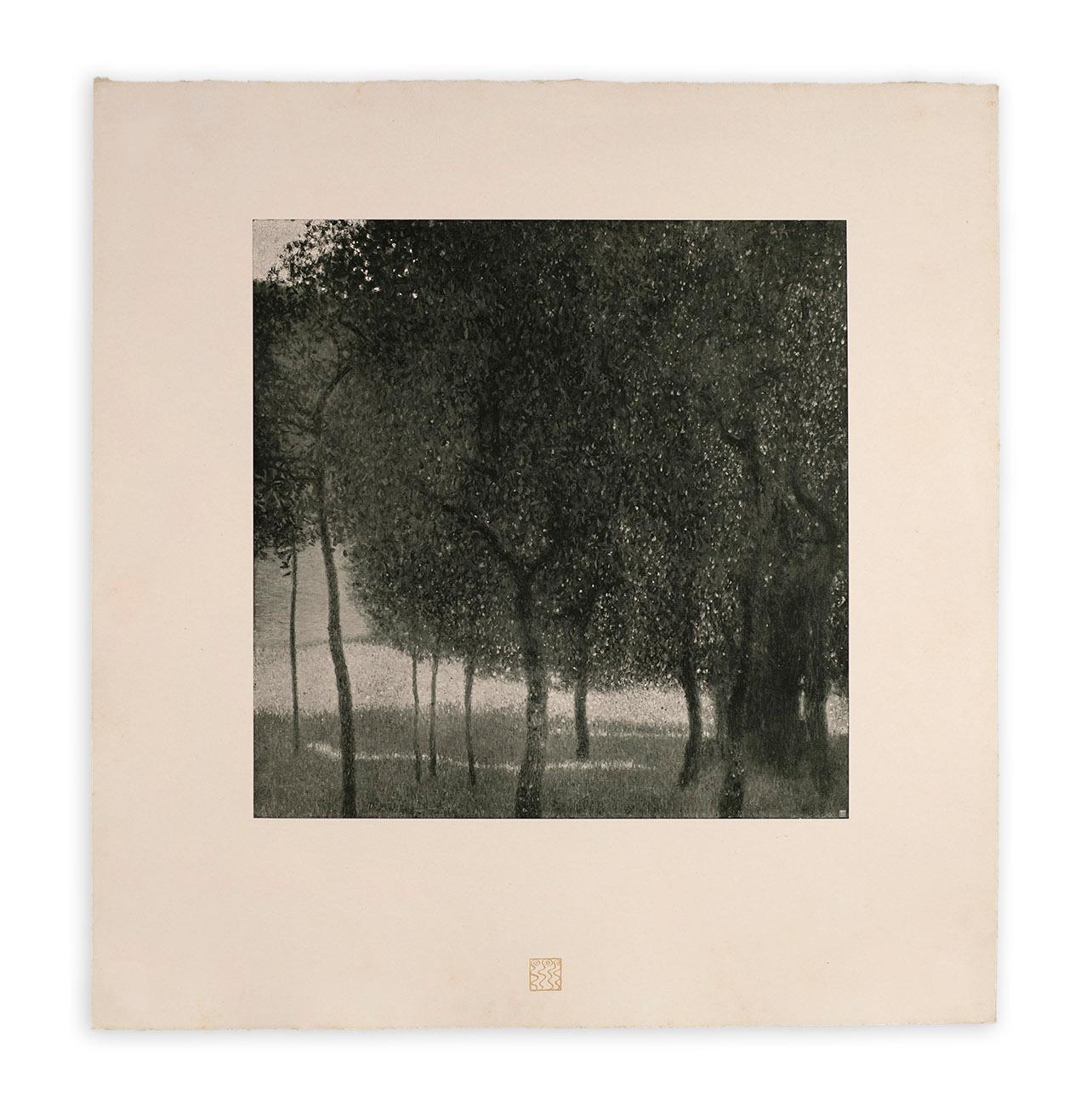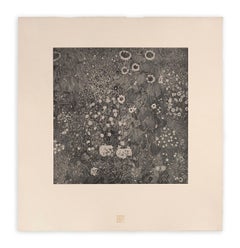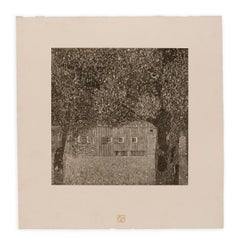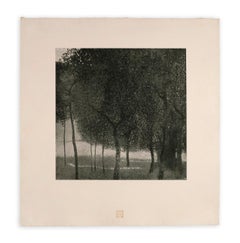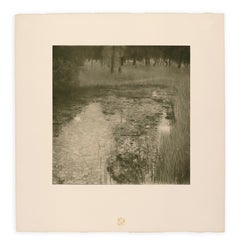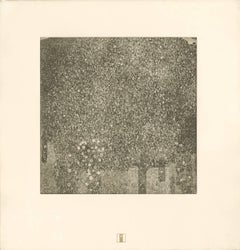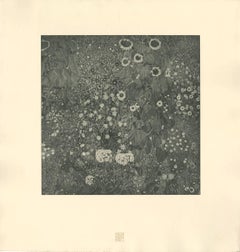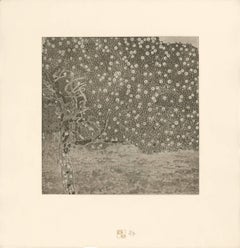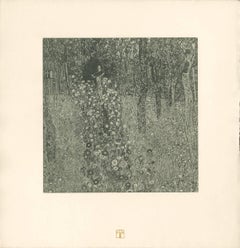Items Similar to Italian Garden Landscape, Gustav Klimt An Aftermath collotype, 1931
Want more images or videos?
Request additional images or videos from the seller
1 of 6
Italian Garden Landscape, Gustav Klimt An Aftermath collotype, 19311931
1931
$1,200
£930.44
€1,055.76
CA$1,720.15
A$1,870.42
CHF 985.53
MX$22,720.13
NOK 12,390.06
SEK 11,614.68
DKK 7,922.58
About the Item
Original 1931 collotype created from Gustav Kilmt’s Italian Garden Landscape, oil on canvas, 1913. Published by Max Eisler and printed by Österreichischer Staatsdruckerei (Austrian State Printing Office), Vienna, in an edition of 500.
In 1931, Max Eisler published the most notable posthumous collection of Gustav Klimt works to date. Using a complex gravure process, Klimt’s original oil paintings were painstakingly reproduced as collotypes on a handmade, deckled-edge cream wove paper. This world-class example of collotype captures the superb resolution and color-richness and ornamentation of the original work painted in 1913.
This piece arrives accompanied by a certificate of authenticity.
Century Guild has curated collections of Gustav Klimt’s printed works on paper for over twenty years. Please contact us directly if you’d like to learn more about this artwork.
- Creation Year:1931
- Dimensions:Height: 18.63 in (47.33 cm)Width: 17.88 in (45.42 cm)Depth: 0.1 in (2.54 mm)
- Medium:
- Movement & Style:
- After:(after) Gustav Klimt (1862 - 1918, Austrian)
- Period:
- Condition:Exceptional condition commensurate with age. Image is pristine and will display beautifully.
- Gallery Location:Chicago, IL
- Reference Number:1stDibs: LU149329144052
About the Seller
5.0
Vetted Professional Seller
Every seller passes strict standards for authenticity and reliability
Established in 1999
1stDibs seller since 2021
40 sales on 1stDibs
- ShippingRetrieving quote...Shipping from: Chicago, IL
- Return Policy
Authenticity Guarantee
In the unlikely event there’s an issue with an item’s authenticity, contact us within 1 year for a full refund. DetailsMoney-Back Guarantee
If your item is not as described, is damaged in transit, or does not arrive, contact us within 7 days for a full refund. Details24-Hour Cancellation
You have a 24-hour grace period in which to reconsider your purchase, with no questions asked.Vetted Professional Sellers
Our world-class sellers must adhere to strict standards for service and quality, maintaining the integrity of our listings.Price-Match Guarantee
If you find that a seller listed the same item for a lower price elsewhere, we’ll match it.Trusted Global Delivery
Our best-in-class carrier network provides specialized shipping options worldwide, including custom delivery.More From This Seller
View AllFarm Garden Sunflowers by Gustav Klimt, Das Werk lifetime collotype, 1908-1912
By Gustav Klimt
Located in Chicago, IL
Original collotype created from Gustav Klimt’s Farm Garden With Sunflowers, painted in 1913. Published and edited by Verlag H.O. Miethke and printed by k.k. Hof- und Staatsdruckerei, Vienna, in an edition of 300.
Between 1908 and 1914, H.O. Miethke published Das Werk Gustav Klimts...
Category
Early 1900s Vienna Secession Prints and Multiples
Materials
Paper
Farmhouse in Buchberg by Gustav Klimt, Das Werk lifetime collotype, 1908-1912
By Gustav Klimt
Located in Chicago, IL
Original collotype created from Gustav Klimt’s Farmhouse in Buchberg (Upper Austrian Farmhouse), painted in 1911. Published and edited by Verlag H.O. Miethke and printed by k.k. Hof- und Staatsdruckerei, Vienna, in an edition of 300.
Between 1908 and 1914, H.O. Miethke published Das Werk Gustav Klimts...
Category
Early 1900s Vienna Secession Prints and Multiples
Materials
Paper
Fruit Trees by Gustav Klimt, Das Werk lifetime landscape collotype, 1908-1912
By Gustav Klimt
Located in Chicago, IL
Original collotype created from Gustav Klimt’s Impressionist Fruit Trees landscape, painted in 1901. Published and edited by Verlag H.O. Miethke and printed by k.k. Hof- und Staatsdruckerei, Vienna, in an edition of 300.
Between 1908 and 1914, H.O. Miethke published Das Werk Gustav Klimts...
Category
Early 1900s Vienna Secession Prints and Multiples
Materials
Paper
The Swamp by Gustav Klimt, Das Werk lifetime landscape collotype, 1908-1912
By Gustav Klimt
Located in Chicago, IL
Original collotype created from Gustav Klimt’s The Swamp, painted in 1900. Published and edited by Verlag H.O. Miethke and printed by k.k. Hof- und Sta...
Category
Early 1900s Vienna Secession Prints and Multiples
Materials
Paper
Schloss Kammer Lake Attersee II by Gustav Klimt, Das Werk collotype, 1908-1912
By Gustav Klimt
Located in Chicago, IL
Original collotype created from Gustav Klimt’s Schloss Kammer on Lake Attersee II (Das Werk Gustav Klimts), originally painted in 1909. Publishe...
Category
Early 1900s Vienna Secession Prints and Multiples
Materials
Paper
Houses at Unterach on the Attersee, Gustav Klimt An Aftermath collotype, 1931
By (after) Gustav Klimt
Located in Chicago, IL
Original 1931 collotype created from Gustav Kilmt’s Houses at Unterach on the Attersee, oil on canvas, c. 1916. Published by Max Eisler and printed by Österreichischer Staatsdruckerei (Austrian State Printing Office), Vienna, in an edition of 500.
In 1931, Max Eisler published the most notable posthumous collection of Gustav Klimt works to date. Using a complex gravure process, Klimt’s original...
Category
1930s Vienna Secession Prints and Multiples
Materials
Paper
You May Also Like
H.O. Miethke Das Werk folio "Rose" collotype print
By Gustav Klimt & K.K. Hof-und Staatsdruckerei
Located in Palm Beach, FL
DAS WERK GUSTAV KLIMTS, a portfolio of 50 prints, ten of which are multicolor collotypes on chine colle paper laid down on hand-made heavy cream wove paper wi...
Category
Early 1900s Vienna Secession Landscape Prints
Materials
Paper
H.O. Miethke Das Werk folio "Farm Garden With Sunflowers" collotype print
By Gustav Klimt & K.K. Hof-und Staatsdruckerei
Located in Palm Beach, FL
DAS WERK GUSTAV KLIMTS, a portfolio of 50 prints, ten of which are multicolor collotypes on chine colle paper laid down on hand-made heavy cream wove paper with deckled edges; under ...
Category
Early 1900s Vienna Secession Landscape Prints
Materials
Paper
H.O. Miethke Das Werk folio "Golden Apple Tree" collotype print
By Gustav Klimt & K.K. Hof-und Staatsdruckerei
Located in Palm Beach, FL
DAS WERK GUSTAV KLIMTS, a portfolio of 50 prints, ten of which are multicolor collotypes on chine colle paper laid down on hand-made heavy cream wove paper with deckled edges; under ...
Category
Early 1900s Vienna Secession Landscape Prints
Materials
Paper
H.O. Miethke Das Werk folio "Cottage Garden with Crucifix" collotype print
By Gustav Klimt & K.K. Hof-und Staatsdruckerei
Located in Palm Beach, FL
DAS WERK GUSTAV KLIMTS, a portfolio of 50 prints, ten of which are multicolor collotypes on chine colle paper laid down on hand-made heavy cream wove paper with deckled edges; under ...
Category
Early 1900s Vienna Secession Landscape Prints
Materials
Paper
H.O. Miethke Das Werk folio "The Great Poplar I" collotype print
By Gustav Klimt & K.K. Hof-und Staatsdruckerei
Located in Palm Beach, FL
DAS WERK GUSTAV KLIMTS, a portfolio of 50 prints, ten of which are multicolor collotypes on chine colle paper laid down on hand-made heavy cream wove paper with deckled edges; under ...
Category
Early 1900s Vienna Secession Landscape Prints
Materials
Paper
H.O. Miethke Das Werk folio "Farm House in Buchberg" collotype print
By Gustav Klimt & K.K. Hof-und Staatsdruckerei
Located in Palm Beach, FL
DAS WERK GUSTAV KLIMTS, a portfolio of 50 prints, ten of which are multicolor collotypes on chine colle paper laid down on hand-made heavy cream wove paper with deckled edges; under each of the 50 prints is a gold signet intaglio printed on the cream paper each of which Klimt designed for the publication as unique and relating to its corresponding image; H.O. Miethke, Editor-Publisher; k.k. Hof-und Staatsdruckerei, Printer; printed in a limited edition of 300 numbered plus several presentation copies; Vienna, 1908-1914.
The idea of collaboration in the arts is anything but new; however it has so often been viewed and assessed as somehow devaluing the intrinsic worth of art. It’s as if it was a dirty secret to be hidden away. More so even than the eroticism explored by Klimt, which divided public opinion, the artistic avant-garde began to boldly flaunt artistic collaboration beginning in the 19th century- which gained steam in the first part of the 20th century- to become a driving vehicle of contemporary artistic creation. Viewed in this context, the folios of collotype prints published by H.O. Miethke in Vienna between 1908-1914 known as Das Werk Gustav Klimts, are important art documents worthy of as much consideration for their bold stand they take on established ways of thinking about artistic collaboration as they are for their breathtakingly striking images.
1908 is indeed a watershed moment in the history of art. To coincide with the 60th anniversary of the reign of Emperor Franz Joseph I, Kunstschau opened in Vienna in May of that year. It was there that Klimt delivered the inaugural speech. Speaking about the avant-garde group’s unifying philosophy of Gesamtkunstwerk, or the synthesis of the arts, Klimt shared his belief that the ideal means to bring artists and an audience together was via “work on major art projects.” It was at Kunstschau 1908 that Klimt first exhibited his most iconic painting, The Kiss, as well as The Sunflower, Water Snakes I and II and Danae. It was at Kunstschau 1908 that Das Werk Gustav Klimts was first available for purchase. Thanks to Galerie Miethke’s organization, Kunstschau 1908 was possible. Miethke’s pioneering art...
Category
Early 1900s Vienna Secession Landscape Prints
Materials
Paper
More Ways To Browse
Marie Therese Picasso Lithograph
Matisse Antillaise
Mckenney Hall Folio
Mcknight Serigraphs
Menton Poster
Metropolitan Museum Of Art Tiffany Stained Glass
Owen Bowen
Oxford Limited
Paul Insect
Peter Blake Alphabet
Picasso Faunes Et Flores
Picasso Vallauris Poster
Pose Jordan Nickel
Poster Maroc Vintage
Poster Maroc
Poster Ville Vintage
Princess Leia
Prints Of Maurice Utrillo
